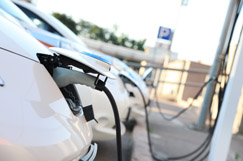Prime minister Rishi Sunak's revised timetable for the banning of petrol and diesel car sales has been enshrined in law.
The new statutory regulatory framework is still 'the most ambitious in the world', according to the Government, and will see 100% of new cars and vans sold in the UK become zero emission by 2035 rather than 2030.

The Government's zero emission vehicle (ZEV) mandate also sets out the percentage of new zero emission cars and vans manufacturers required each year up to 2030.
Under this programme, 80% of new cars and 70% of new vans sold in Great Britain will now be zero emission by 2030.
Technology and decarbonisation minister Anthony Browne said: 'Alongside us having spent more than £2bn in the transition to electric vehicles, our zero emission vehicle mandate will further boost the economy and support manufacturers to safeguard skilled British jobs in the automotive industry.
'We are providing investment certainty for the charging sector to expand our charging network which has already grown by 44% since this time last year. This will support the constantly growing number of EVs in the UK, which currently account for over 16% of the new UK car market.'
There are now over 50,000 public chargepoints in the UK, with 44% more than this time last year.
The Department for Trasport claims this puts the country well on track to reach its target of 300,000 chargepoints by 2030.
However, with around 15,000 charge points added in the last year, the current rate would see just over 90,000 added in the next six years, taking the total to around 150,000.
Applications for the first round of the £381m Local EV Infrastructure Fund 'are currently being assessed', the DfT said.
This funding will deliver chargepoints in local areas across England and transform the availability of charging for drivers without off-street parking




